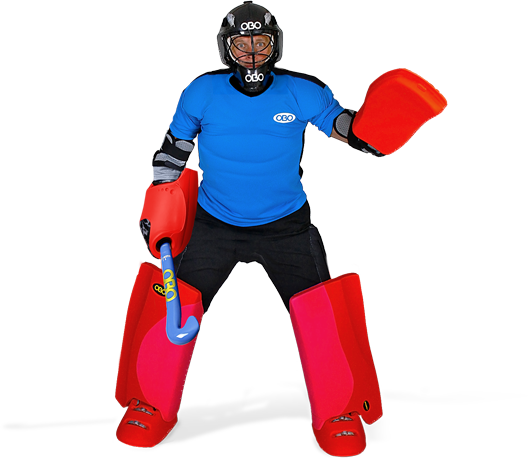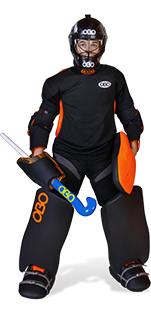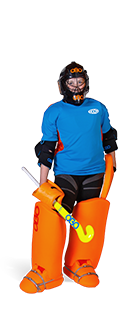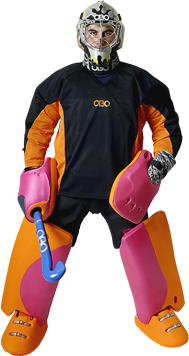KEEPERS RESOURCES

Positioning
 Question:
Question:
Firstly I read a q&a about obstruction and having had that problem in a match where a attacker was "camping" in front of me through a whole game and after repeatedly complaining to the ump I preceded to push the attacker and when penalised with a p stroke I pointed out why I had infringed in a relaxed manner and also listened to the ump. He overturned his decision after hearing mine and my sweeper’s side and gave the offending attacker a yellow card. This is not encouragement to take matters into your own hands, especially South African keepers as we tend to play a "rough" game of hockey. My question Jon is during games I can, when called on to pull off amazing saves, do so with ease. But my problem comes with my left post, all goals I concede are around this post and generally are soft, I am pretty sure that it is my positioning that is problem but I always revert my positioning back to my old one when trying to change it. Can you suggest any drills that would help to improve my positioning or to able me to cover my left post.
Answer:
The obstruction issue is an ongoing one and I’m sure will continue to be a recurring one. I’ve had a number of keepers who I know have taken matters in to their own hands and been successful (i.e. being physical back). I will say that I’m surprised that an umpire reversed a penalty stroke decision. It takes a confident umpire to review what’s happened and reverse a decision. An umpire is supposed to make their decisions based on what they see, not what’s explained to them. I’m assuming the trail umpire was able to offer what they saw and that’s how the game should work. I’m not advocating that a goalkeeper let a forward run all over him or her. I think you need to have a number of ways to deal with the situation. Start with the umpire, next is playing in front of the camper and lastly is playing through the “camper.” If a camper is making no effort to go to a ball that’s played at goal, you have every right to go to that ball. There’s nothing in the rules that says that the goalkeeper has to be a sitting duck, but there’s a difference between playing hard and playing dirty. At the end of the day, I can live with hard, dirty has no business in hockey.
On to the ominous left post. I’m assuming you mean your left post as your facing out from the goal, which means that these goals are to your left foot. Whether it’s left foot or right foot, the mechanics of the problem are basically the same. Typically, when you’re allowing a majority of goals to one side it’s because you have a dominant/strong side. For most keepers, their right foot is the stronger foot. I’d ask where you’re allowing these goals from, as far as what the lead up to the scoring shot is. . Are the shots coming from straight shots at the top of the circle, are they from balls passed from the right to the left, or left to right? The answer will affect what you need to work on. For straight shots at the top of the circle, I’ll point you to the tip on Basic Positioning: Ready Position. I think the big problem keepers have with having a majority of goals scored to one post from the top of the circle is not being balanced in their ready position. As a result, they end up throwing a foot out to make a save, rather than pushing off their non-saving leg as well as throwing the saving foot out to make a save. If your having problems with a change of angle, i.e. a pass from one side to the other, please check the tip on Basic Positioning: Angles. I think a lot of keepers have troubles with shots on balls passed from right to left as you look out. First off, we’re concerned about covering the right far post (the place where most forwards shoot). As a result, we have a tendency to anticipate/cheat. In addition, many keepers move along the line of the pass. As a result, they’re not square to the shooter when the shot’s taken. Square is shoulder and hips perpendicular to a line between the shooter and the goal. Another problem could be not being balanced as the shot is taken. If you’re getting caught with your weight on one leg when the shot is taken, you’re going to have a hard time pushing off to get to a ball.
What you can do to fix the problem is going to depend on the type of goals you’re allowing. First focus on mechanics and situations. You should have some ideas on things to try. Next, use drills that address the situation. For change of angle, try setting up on a cone as you might with a ball on the right and set up a shooter on the left. On their call of “go” you move across as they put a ball to the left post. A couple of things about drills. Check the Training on Your Own Tip. In the beginning, drills should be to develop a weakness, but don’t cheat. Most keepers can figure out a way to make a drill work when they know where the ball is going. The game isn’t played that way. Shooters should be able to help you work on your weakness while challenging you to be honest in playing a situation and all it’s variables.
Comments
Leave Your Comments Below















